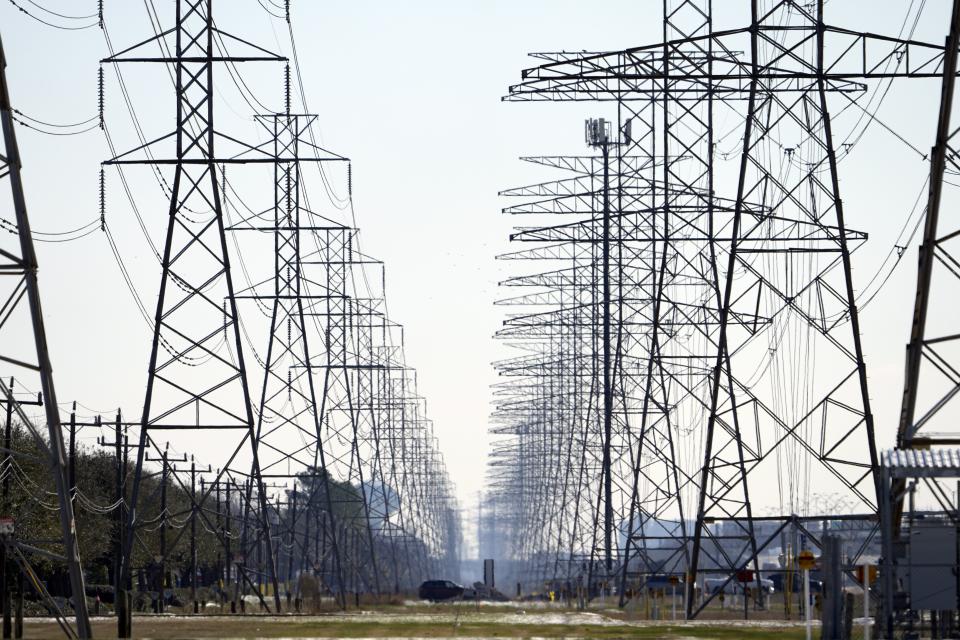'Marginally better': Texas power grid still vulnerable to extreme winter weather, federal report warns
A federal assessment indicates the Texas electricity grid remains almost as vulnerable to extreme winter weather as it was when it nearly collapsed during a prolonged deep freeze in February 2021 — although state utility regulators contend the analysis is flawed.
"The (Federal Energy Regulatory Commission) report contained inaccuracies and ERCOT has called on the agency to correct the report," said Rich Parsons, a spokesperson for the Public Utility Commission of Texas.
The Public Utility Commission oversees the Electric Reliability Council of Texas, which manages the state's power grid.
Mary O'Driscoll, a spokesperson for the Federal Energy Regulatory Commission, released an updated version of the agency's assessment late Tuesday, but it drew the same conclusion as the original version dated Oct. 20 in terms of a potential shortfall during extreme winter conditions.
According to the document, the ability of the ERCOT grid to handle extreme winter weather along the lines of what hit the state in February 2021 appears to be only marginally better, despite more than 18 months of effort to make the grid more dependable — as well as assurances from state regulators, and from Gov. Greg Abbott, that it is significantly improved.
Consumer demand for electricity on the Texas grid could exceed available generation capacity by 18,100 megawatts under a winter scenario similar to what triggered the 2021 disaster, the report says.
More:New ERCOT CEO Pablo Vegas: 'Continued reliable execution' is goal for Texas power grid
During that freeze, ERCOT ordered power providers around the state to cut off consumers — at one point totaling 20,000 megawatts of demand, according to a previous federal analysis — to prevent the grid from failing completely. The ensuing blackouts contributed to hundreds of deaths and billions of dollars in property damage.
One megawatt of electricity is enough to power about 200 homes during periods of peak demand.
Parsons didn't detail what state regulators purport to be inaccuracies in the federal assessment, instead directing the questions to ERCOT.
ERCOT spokesperson Christy Penders said late Tuesday that ERCOT had asked the federal commission to change an incorrect statement in the report that misstated ERCOT’s own assessment of the chances that there might be a grid emergency this winter, and it did so.
“ERCOT identified an incorrect statement in the probabilistic risk assessment section” of the report, Penders said. “ERCOT’s assessment reflected a ‘low’ probability of Energy Emergency Events occurring during the expected daily peak load hour. We have asked FERC to correct this error which they have done.”
The federal assessment indicates the ERCOT grid will have more than enough generating capacity this winter under typical weather conditions.
"Basically, what (the federal energy commission) is saying is if we get weather conditions like in February '21, we would have close to a repeat of what happened," said Doug Lewin, president of Austin-based energy consulting company Stoic Energy.
The federal agency "is sounding the alarm very clearly," Lewin said. "The risk that existed (in February 2021), for all intents and purposes, is about the same heading into this winter."
Still, weather conditions are not expected to be that bad, according to the federal report. It points to a forecast from the National Oceanic and Atmospheric Administration for December through February indicating a 50% to 80% likelihood of higher-than-average temperatures in Texas and some other regions of the United States.
More:Despite calls to conserve, top regulator says he has 'full confidence' in Texas power grid
Texas utility regulators have taken a number of measures since the February 2021 disaster that are aimed at making the power grid more reliable.
They include weatherization requirements put in place ahead of last winter for power plants, solar arrays and wind turbines, as well as similar requirements enacted in August for certain natural gas infrastructure deemed critical to the functioning of the grid. The Public Utility Commission, at the direction of the Legislature, also is in the process of developing a long-term redesign of the ERCOT market in an effort to boost its dependability.
Peter Lake, chairperson of the utility commission who was appointed to his post by Abbott in the aftermath of the February 2021 grid disaster, has repeatedly described the grid as more reliable than ever, saying as recently as two weeks ago that it's "ready for anything Mother Nature throws at us."

His confidence has so far been validated, with no grid emergencies since the 2021 calamity.
More:Texas natural gas sector balks at potential new oversight aimed at boosting grid
The extreme heat wave this summer presented a challenge, prompting record demand for power and some calls by ERCOT officials for voluntary conservation in July. But those situations never tipped into emergencies that might have prompted more drastic measures.
Previous seasonal assessments of the Texas grid in the wake of the February 2021 disaster — including assessments ahead of last winter by ERCOT and by the Federal Energy Regulatory Commission — also have indicated that extreme weather-related circumstances could cause generation capacity in the state to fall far short of electricity demand, with significant power outages the likely outcome.
Editor's note: This story has been updated with a statement from ERCOT spokesperson Christy Penders.
This article originally appeared on Austin American-Statesman: ERCOT: Federal view Texas power grid at risk to winter weather flawed

